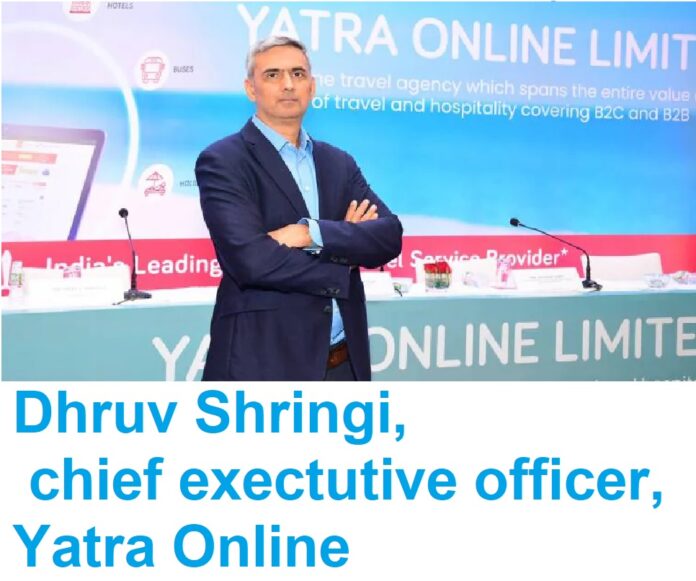Domestic aviation is the main force in the travel industry, according to Dhruv Shringi, chief executive officer of Yatra Online. He continued by saying that the expansion of the travel industry was partly a result of shifting consumer behavior, which is largely migrating online.
Yatra Online’s chief executive officer, Dhruv Shringi. In September, the travel technology startup Yatra will begin its first public offering.
Travel-tech startup Yatra declared ahead of its initial public offering (IPO) that it is placing a significant amount of money on the growth anticipated in the travel sector at a CAGR (compound annual growth rate) between 9 and 11 percent over the following five years. In order to increase revenues, the corporation is also concentrating on the new freight area.
According to a Crisil analysis, the Indian travel sector expanded at a CAGR of 6 to 8 percent from FY17 to FY23, reaching a size of Rs 2,82,500-2,84,500 crore. The industry is predicted to reach Rs 4,54,000–4,56,000 crore by FY28, driven by the development of tourism infrastructure, rising income levels translating to higher discretionary spending on travel and tourism, an increase in the frequency of travel for business and leisure purposes, visa reforms, and improved connectivity between modes of transportation, the report said.
“In the travel industry, domestic aviation is the main force. The airlines are gradually increasing the number of planes in the nation. We currently have less than 700 aircraft in India, and we already have more than twice as many on order. Therefore, over the course of the next ten years, we will witness a great amount of fleet expansion, said Dhruv Shringi, chief executive officer of Yatra Online, at a press conference.
“We are seeing a lot of growth in terms of airport infrastructure,” he continued. Newer airports are opening in Tier II and III cities, while major airport expansion is taking place in the major metropolises. The infrastructure for travel is expanding significantly.
The CEO emphasized that travel is no longer restricted to the top 5–10 cities because they are seeing strong demand come from at least 25–30 locations in India. As we observe airport expansion taking place in these regions, “we will use our 30,000 agents to go deeper in the tier II, III markets.”
As of FY23, the air ticketing segment held a 50–52% share of the Indian travel industry, with a CAGR of 8.5–9.5% between FY17 and FY23. The economic trend is anticipated to continue through FY28 at a CAGR of 12–13%. As of fiscal 2028, air ticketing is anticipated to continue to dominate the Indian travel market.
Shringi attributed the industry’s expansion to the evolving consumer trends, particularly those related to internet shopping. The Indian travel industry’s internet penetration, which is measured as the percentage of bookings made online, is currently between 66 and 68 percent as of FY23, up from between 59 and 61 percent in FY20. By FY28, it is anticipated to rise to 73-75 percent, according to the data previously mentioned.
“In terms of consumer purchasing habits, Covid has been a major force in the uptake of online shopping. Both Yatra’s B2B (business to business) and B2C (business to customer) segments benefit from this. We are witnessing a significant shift in business travel as a result of hybrid working, which has accelerated the adoption of ICT. Over the next five years, we anticipate a CAGR of between 14 and 15 percent for business travel, says Shringi.
The online ticketing market is anticipated to increase 1.75 times to Rs 3,33,500 crore–3,35,500 crore by FY28 from its size in FY23 of Rs 1,90,000–1,92,000 crore.
Yatra also plans to expand into a brand-new market called freight. We are developing a freight solution for a corporate client. Some of our major clients include SRF and Havells. These are the businesses that spend hundreds of billions of rupees on freight each year. Therefore, we are currently developing this (a technology-enabled digital freight forward platform) solution for the upcoming five to ten years. This is a fresh endeavor. It’ll be a fantastic source of revenue, according to Shringi.


